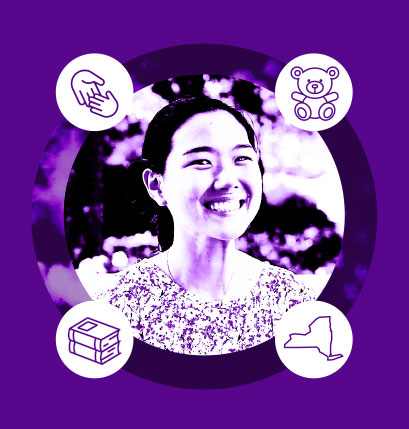“I had a lot of apprehensions.” When Mayu Ishikawa, a NYU Teacher Residency 2020 graduate in the special education content area, considered teaching, she couldn’t shake the feeling of needing to be absolutely perfect.
“To me, I felt like teachers just had to be really, really good people. . . who knew a lot!” She wondered openly about what gifts she had to share with students. Despite her concerns, she couldn’t shake her desire to become an educator.
Finding her way to special education
Mayu graduated from college and felt the urgency to build a professional life for herself and a life for her new baby, whom she was raising on her own. With encouragement from her parents, she concluded that she must pursue her lifelong passion for teaching. Mayu applied to the NYU Teacher Residency primarily because of its immersive design; she believed that anything less than full immersion with guided support would be “detrimental for the teacher and the student.”
The decision of which subject to specialize in was much less clear. “I chose special education because I was unsure about the content I wanted to teach. All I knew was that I really wanted to be a teacher, I really liked kids, and I loved all the subjects. I had teachers who were very passionate about their content areas and that’s important for students, but I didn’t have that.” Mayu’s drive was simply to be a supportive adult figure for her students in the way that her middle school teachers were for her.
The mentorship of Danielle Camero – her special education co-teacher at Brooklyn Prospect Charter Schools’ Clinton Hill Middle campus – gave Mayu confidence in special education. This, combined with the course work and constant feedback from NYU Steinhardt faculty, affirmed Mayu’s choice of a program with a yearlong immersion in the classroom.
“Special education is the best place to learn how to teach, because you have to think of ways to make content accessible to all types of learners; all educators should be conscious of that,” Mayu explained. “I think that the NYU Steinhardt course work did a really good job of covering a wide range of areas, and it taught us how to deal with so many situations. But, a lot of things with special education, you can only learn from real experience.”
The NYU Teacher Residency encouraged Mayu to test what works best for students, where they need extra support, and perhaps most importantly, learn their vast gifts and potential.
Relating to, understanding, and advocating for students
“It’s important to be an ally to students, not just as a special education teacher, but as an educator in general.” Mayu’s focus on equity and awareness of injustices in the education system drives her work. She’s come to see that in her role as a special education teacher she must pay attention to and address prejudices.
“Identification of special education students tends to be more skewed to Black and brown students, and students with behavioral issues.” Within the education system, she noticed a lack of deep understanding of, and attention to, what special education students need and a quick assumption of labels that end up hurting students.
Mayu recalled a formative story from the Teacher Residency: “One student was very physical, and I was not expecting that. He also had a lot of difficulties not calling out in the classroom.” When she sought initial guidance, some teachers suggested removing him from class if he was too disruptive.
Being new to the profession, Mayu called upon her colleagues and Tamara Sewell, residency director and clinical assistant professor in special education for NYU Steinhardt, to observe her class. Instead of punishing the student and removing him from class, Mayu wanted to figure out how to better connect with the student and make him feel comfortable in his learning environment.
The student belonged to a stuffed animal club with a few other students. Mayu learned from his mom that he used to wear a weighted vest to give him the sensory stimulation necessary to help him feel calmer and focused. However, he stopped using the weighted vest because some kids would make fun of him for it. With that history in mind and knowing his love of stuffed animals, Mayu decided to fill a stuffed animal with rice and beans, so he could better cope with his learning exceptionalities and still be part of the stuffed animal club.
“It is my job to be the students’ ally, understand them, and guide them, but I’m not there to do the work for them; that is detrimental. They need to learn their own strategies to be in the world.”
Undergirding Mayu’s belief that all children deserve a quality education is an idea that she learned during her first year as a special education teacher resident: being vulnerable to show her true authentic self allowed her to connect with her students. Most of all, Mayu recognizes it’s not about being the perfect teacher; it’s about dedication to students: “You need to have a deep commitment to learning about equity, access, and the institutional problems, and how to create more culturally responsive spaces. If not, teachers can do more harm to the students than good.”
